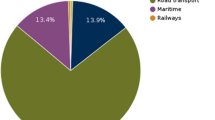Abstract
Green logistics is an emerging area in supply chain management, which has been shown to have tremendous impacts in recent years to face the serious climate changes risks. In this paper, the fuel consumption and fuzzy travel time have been delineated in developing and solving the green-fuzzy vehicle routing problem as an extension of the celebrated VRP in which routes are performed to reduce the total expenditure. Different from the existing solution manners, we transform the original fuzzy chance constrained programming model into an equivalent deterministic model, and then revise the original hybrid intelligent algorithm by replacing the embedded fuzzy simulation with analytical function calculation. Finally, a comparative study with the corresponding literature is performed, which shows that the revised algorithm can not only improve the solution accuracy but also shorten the runtime greatly.




Similar content being viewed by others
Explore related subjects
Discover the latest articles and news from researchers in related subjects, suggested using machine learning.References
Allahviranloo M, Chow JYJ, Recker WW (2014) Selective vehicle routing problems under uncertainty without recourse. Transp Res E 62(2):68–88. https://doi.org/10.1016/j.tre.2013.12.004
Alshamrani A, Mathur K, Ballou RH (2007) Reverse logistics: simultaneous design of delivery routes and returns strategies. Comput Oper Res 34(2):595–619. https://doi.org/10.1016/j.cor.2005.03.015
Bektas T, Laporte G (2011) The pollution-routing problem. Transp Res B 45(8):1232–1250. https://doi.org/10.1016/j.trb.2011.02.004
Cao E, Lai M (2010) The open vehicle routing problem with fuzzy demands. Expert Syst Appl 37(3):2405–2411. https://doi.org/10.1016/j.eswa.2009.07.021
Clarke G, Wright JW (1964) Scheduling of vehicles from a central depot to a number of delivery points. Oper Res 12(4):568–581. https://doi.org/10.1287/opre.12.4.568
Dantzig GB, Ramser JH (1959) The truck dispatching problem. Manag Sci 6(1):80–91. https://doi.org/10.1287/mnsc.6.1.80
Dror M, Laporte G, Trudeau P (1994) Vehicle routing with split deliveries. Discrete Appl Math 50(3):239–254. https://doi.org/10.1016/0166-218X(92)00172-I
Du J, Li X, Yu L, Dan R, Zhou J (2017) Multi-depot vehicle routing problem for hazardous materials transportation: a fuzzy bilevel programming. Inf Sci 399:201–218. https://doi.org/10.1016/j.ins.2017.02.011
Gaur DR, Mudgal A, Singh RR (2013) Routing vehicles to minimize fuel consumption. Oper Res Lett 41(6):576–580. https://doi.org/10.1016/j.orl.2013.07.007
Gu Y, Zhou J, Yu L, Yi X (2017) On the simulation method for the credibility and critical value of fuzzy variables. Technical Report
Koc C, Karaoglan I (2016) The green vehicle routing problem: a heuristic based exact solution approach. Appl Soft Comput 39:154–164. https://doi.org/10.1016/j.asoc.2015.10.064
Kuo RJ, Wibowo BS, Zulvia FE (2016) Application of a fuzzy ant colony system to solve the dynamic vehicle routing problem with uncertain service time. Appl Math Model 40(23):9990–10001. https://doi.org/10.1016/j.apm.2016.06.025
Lin C, Choy KL, Ho GTS, Lam HY (2014) Survey of green vehicle routing problem: past and future trends. Expert Syst Appl 41(4):1118–1138. https://doi.org/10.1016/j.eswa.2013.07.107
Liu B (2004) Uncertainty theory: a branch of mathematics for modeling human uncertainty. Springer, Berlin
McKinnon AC, Piecyk MI (2009) Measurement of CO\(_2\) emissions from road freight transport: a review of UK experience. Energy Policy 37(10):3733–3742. https://doi.org/10.1016/j.enpol.2009.07.007
Montoya A, Gueret C, Mendoza JE, Villegas JG (2016) A multi-space sampling heuristic for the green vehicle routing problem. Transp Res C 70:113–128. https://doi.org/10.1016/j.trc.2015.09.009
Montoya A, Gueret C, Mendoza JE, Villegas JG (2017) The electric vehicle routing problem with nonlinear charging function. Transp Res B 103:87–110. https://doi.org/10.1016/j.trb.2017.02.004
Nadizadeh A, Nasab HH (2014) Solving the dynamic capacitated location-routing problem with fuzzy demands by hybrid heuristic algorithm. Eur J Oper Res 238(2):458–470. https://doi.org/10.1016/j.ejor.2014.04.012
Nguyen VA, Jiang J, Ng KM, Teo KM (2016) Satisficing measure approach for vehicle routing problem with time windows under uncertainty. Eur J Oper Res 248(2):404–414. https://doi.org/10.1016/j.ejor.2015.07.041
Prive J, Renaud J, Boctor F, Laporte G (2006) Solving a vehicle-routing problem arising in soft-drink distribution. J Oper Res Soc 57(9):1045–1052. https://doi.org/10.1057/palgrave.jors.2602087
Samanlioglu F (2013) A multi-objective mathematical model for the industrial hazardous waste location-routing problem. Eur J Oper Res 226(2):332–340. https://doi.org/10.1016/j.ejor.2012.11.019
Sambracos E, Paravantis JA, Tarantilis CD, Kiranoudis CT (2004) Dispatching of small containers via coastal freight liners: the case of the Aegean Sea. Eur J Oper Res 152:365–381. https://doi.org/10.1016/S0377-2217(03)00030-4
Shi Y, Boudouh T, Grunder O (2017) A hybrid genetic algorithm for a home health care routing problem with time window and fuzzy demand. Expert Syst Appl 72:160–176. https://doi.org/10.1016/j.eswa.2016.12.013
Tang J, Pan Z, Fung RYK, Lau H (2009) Vehicle routing problem with fuzzy time windows. Fuzzy Set Syst 160(5):683–695. https://doi.org/10.1016/j.fss.2008.09.016
Teodorovic D, Pavkovic G (1996) The fuzzy set theory approach to the vehicle routing problem when demand at nodes is uncertain. Fuzzy Set Syst 82(3):307–317. https://doi.org/10.1016/0165-0114(95)00276-6
Tillman FA (1969) The multiple terminal delivery problem with probabilistic demands. Transp Sci 3(3):192–204. https://doi.org/10.1287/trsc.3.3.192
Wang Y, Ma X, Xu M, Wang Y, Liu Y (2015) Vehicle routing problem based on a fuzzy customer clustering approach for logistics network optimization. J Intell Fuzzy Syst 29(4):1427–1442. https://doi.org/10.3233/IFS-151578
Xiao Y, Zhao Q, Kaku I, Xu Y (2012) Development of a fuel consumption optimization model for the capacitated vehicle routing problem. Comput Oper Res 39(7):1419–1431. https://doi.org/10.1016/j.cor.2011.08.013
Yalcin GD, Erginel N (2015) Fuzzy multi-objective programming algorithm for vehicle routing problems with backhauls. Expert Syst Appl 42(13):5632–5644. https://doi.org/10.1016/j.eswa.2015.02.060
Zadeh LA (1979) A theory of approximate reasoning. Mach Intell 9(9):149–194
Zheng Y, Liu B (2006) Fuzzy vehicle routing model with credibility measure and its hybrid intelligent algorithm. Appl Math Comput 176(2):673–683. https://doi.org/10.1016/j.amc.2005.10.013
Zhong S, Pantelous AA, Beer M, Zhou J (2018) Constrained non-linear multi-objective optimization of preventive maintenance scheduling for offshore wind farms. Mech Syst Signal Process 104:347–369. https://doi.org/10.1016/j.ymssp.2017.10.035
Zhou J, Yang F, Wang K (2016) Fuzzy arithmetic on LR fuzzy numbers with applications to fuzzy programming. J Intell Fuzzy Syst 30(1):71–87. https://doi.org/10.3233/IFS-151712
Acknowledgements
The authors would like to acknowledge also the gracious support of this work by “Shuguang Program” from Shanghai Education Development Foundation and Shanghai Municipal Education Commission (Grant no. 15SG36), and the Recruitment Program of High-end Foreign Experts (Grant no. GDW20163100009).
Author information
Authors and Affiliations
Corresponding author
Rights and permissions
About this article
Cite this article
Wang, R., Zhou, J., Yi, X. et al. Solving the green-fuzzy vehicle routing problem using a revised hybrid intelligent algorithm. J Ambient Intell Human Comput 10, 321–332 (2019). https://doi.org/10.1007/s12652-018-0703-9
Received:
Accepted:
Published:
Issue Date:
DOI: https://doi.org/10.1007/s12652-018-0703-9
Keywords
Profiles
- Jian Zhou View author profile




